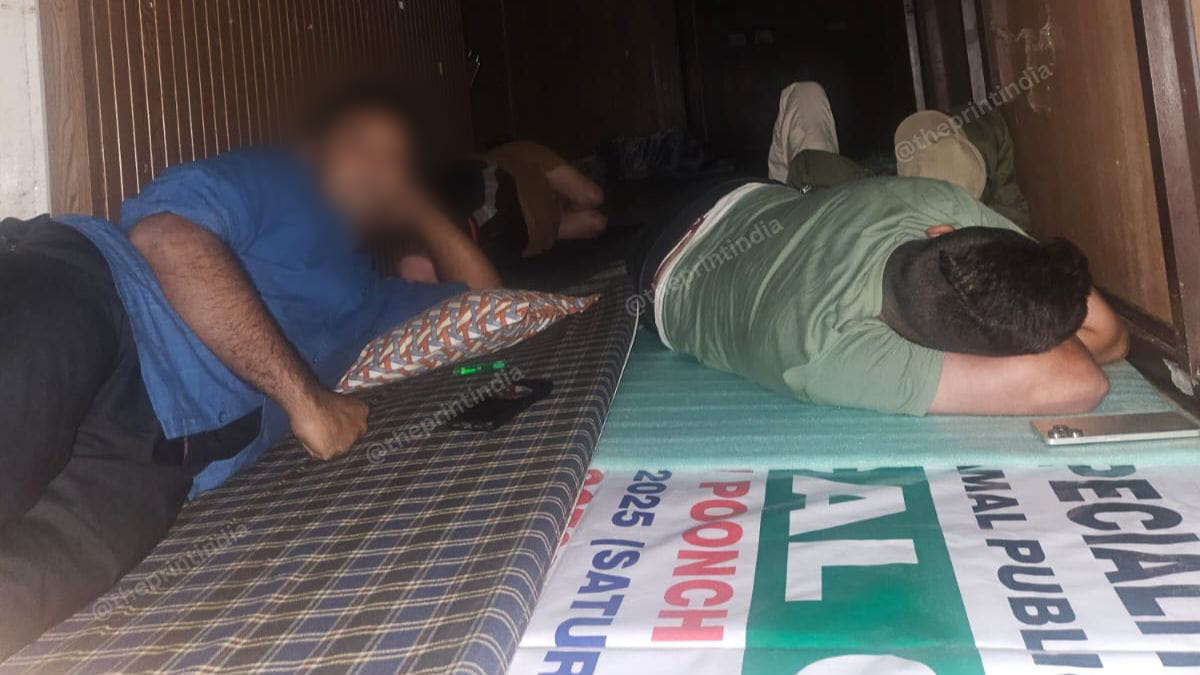Poonch, Jammu & Kashmir: Soon after reports of drone activity in Jammu and India’s response began to surface Thursday, Poonch district in Jammu and Kashmir came under fierce shelling with medium and heavy weapons.
By Thursday night, the air was thick with tension as a group of journalists—including this reporter from ThePrint—huddled inside a so-called protected house, an administrative building that felt very close to danger.
The night began with journalists tucked into rooms of the ‘protected house’, filing stories, uploading videos, and some going live on air. Around 7 pm, a siren blared, as we carried on with our work, unaware of what was about to unfold.
It was around the same time that reports began pouring in of Pakistani unmanned aerial vehicles targeting Jammu airport—and Indian air defence systems intercepting them.
By 7.15 pm, loud blasts echoed in the distance. I had just filed a report on how Pakistani shelling in Poonch had already killed over a dozen people and injured at least 44.
It felt like there would be no more attacks that night. However, the firing began to intensify—as did the stream of reports from Jammu, Akhnoor, Uri and elsewhere, warning of possible incursions. Eventually, all the reporters and a few officials huddled on the ground floor of the three-storey building, after the staff insisted we come down. We were then shift to another spot within the compound.
The town had just lived through a horrifying day—homes, government buildings, places of worship, schools—nothing had been spared.
All the reporters were glued to their phones, chasing updates—from reports of Pakistan breaching Indian airspace, and India’s countermeasures, to sudden blackouts in cities across north and west India. The room was abuzz with calls and rapid note-taking, even as the chaos outside kept everyone on edge.
The skies over Poonch were under relentless fire—a barrage of explosions of every kind. Some rumbled with deep reverberations, others came with a 3-4 second whistle before detonating.
Meanwhile, a different wave of reports flooded on TV news channels, social media, and WhatsApp. “Islamabad par Bharat ka kabza“, “Islamabad conquered by India”, “Indian Navy pounds Karachi water port”, “Pakistan Army Chief Asim Munir arrested and replaced”. All of this has stands debunked as misinformation.
Despite a complete blackout, our rooms remained faintly lit by the glow of mobile phone screens. As the night wore on, the blasts grew louder and closer. “This one’s ours, from our heavy guns,” a security official said.
As a clearer picture emerged about the attacks on various Indian defence bases, the energy in the room started to mellow. At around 1 am, a 5-second-long whistle followed by a deafening explosion just above our building brought everyone together. We heard something crash onto the roof. “Yeh gole ke tukde hain (these are shrapnel from artillery shells),” one official said.
Every time the whistle sounded, likely from a falling mortar or artillery shell, I—along with everyone else—would count the seconds silently and brace myself for the inevitable impact.

By 2.30 am, the room was pitch black. Nearly everyone had stayed awake since Operation Sindoor was launched by the Indian Defence Forces.
As the explosions grew louder, the room grew quieter. For a moment, I thought everyone had fallen asleep—but only a few had. Around 3 am, after another massive blast, we heard a woman crying in the distance. We inquired, but an official assured us, “It will be taken care of by the authorities. Don’t worry.”
By morning, as the first light crept in, the intensity began to subside. By 5.30 am, it had stopped.
A senior BBC journalist and I opened the main door and stepped on to the porch. There was nothing but eerie silence. We found a shard of shrapnel, nearly an inch long.
After the security officials completed their “combing walk”, I ventured out for a brief walk to the main gate—where I found more quiet, and a handful of shrapnel pieces scattered across the ground.
(Edited by Zinnia Ray Chaudhuri)
Also read: Pahalgam justice isn’t about deaths or strikes. It’s in 2 women, 2 uniforms, 2 identities






